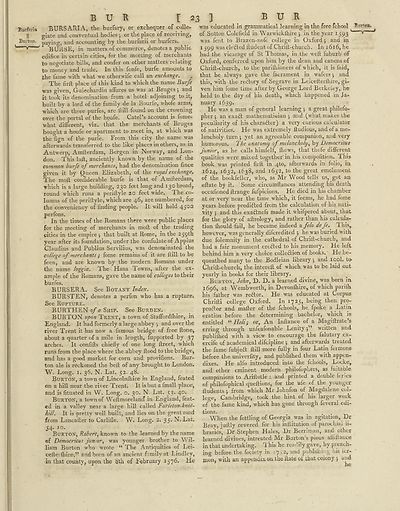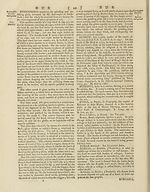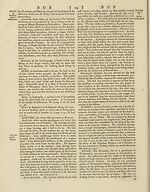Encyclopaedia Britannica, or, a Dictionary of arts, sciences, and miscellaneous literature : enlarged and improved. Illustrated with nearly six hundred engravings > Volume 5, BUR-CHI
(33) Page 23
Download files
Complete book:
Individual page:
Thumbnail gallery: Grid view | List view

B U K [ 23 ] BUR
Burfaria BURS ARIA, the burfary, or exchequer of colle-
i! giate and conventual bodies •, or the place of receiving,
Burton, paying, and accounting by the burfarii or burfers.
BURSE, in matters of commerce, denotes a public
edifice in certain cities, for the meeting of merchants
to negotiate bills, and confer on other matters relating
to money and trade. In this fenfe, burfe amounts to
the fame with what we otherwife call an exchange.
The fir it place of this kind to which the name Burfe
was given, Guiechardin affures us was at Bruges j and
it took its denomination from a hotel adjoining to it,
built by a lord of the family de la Bourie, whofe arms,
■winch are three purfes, are iiill found on the crowning
over the portal of the houfe. CatePs account is fome-
what different, viz. that the merchants of Bruges
bought a houfe or apartment to meet in, at which was
the fign of the purfe. From this city the name was
afterwards transferred to the like places in others, as in
Antwerp, Amfterdam, Bergen in Norway, and Lon¬
don. This laft, anciently known by the name of the
common burfe of merchants, had the denomination fince
given it by Queen Elizabeth, of the royal exchange.
The moft conliderable burfe is that of Amfterdam,
which is a large building, 230 feet long and 130 broad,
round which runs a periftyle 20 feet wide, ihe co¬
lumns of the periftyle, which are 46, are numbered, for
the conveniency of finding people. It will hold 45°°
perfons.
In the times of the Romans there were public places
for the meeting of merchants in moft of the trading
cities in the empire } that built at Rome, in the 259th
year after its foundation, under the confulate of Appius
Claudius and Publius Servilius, was denominated the
college of merchants ; fome remains of it are ftill to be
feen, and are known by the modern Romans under
the name loggia. The Hans Towns, after the ex¬
ample of the Romans, gave the name of colleges to their
burfes.
BURSERA. See Botany Index.
BURSTEN, denotes a perfon who has a rupture.
See Rupture.
BURTHEN of a Ship. See Burden.
BURTON upon Trent, a town of Staffordftiire, in
England. It had formerly a large abbey ; and over the
river Trent it has now a famous bridge of free ftone,
about a quarter of a mile in length, fupported by 37
arches. It confifts chiefly of one long ftreet, which
runs from the place where the abbey flood to the bridge,
and has a good market for corn and provifions. Bur¬
ton ale is reckoned the beft of any brought to London.
W. Long. 1. 36. N. Lat. 52. 48.
Burton, a town of Lincolnlhire in England, feated
on a hill near the river Trent. It is but a fmall place,
and is fituated in W. Long. o. 30. N Lat. 53. 40.
Burton, a town of Weftmorelancf in England, feat¬
ed in a valley near a large hill called Farleton-knot-
hill. It is pretty well built, and lies on the great road
from Lancafter to Carlifle. W. Long. 2. 35. N. Lat.
54. 10.
Burton, Robert, known to the learned by the name
©f Democritus jun or, was younger brother to Wil¬
liam Burton who wrote “ The Antiquities of Lei-
cefterlhire,” and born of an ancient Emily at L indley,
in that county, upon the 8th of February 157b. He
wTas educated in grammatical learning in the free fchool Burfen.
of Sutton Colefield in Warwickfhire j in the year 1593 " ~
was fent to Brazen-nofc college in Oxford $ and in
1599 was elefted ftudent of Chrift-church. In 1616, he
had the vicarage of St Thomas, in the weft fuburb of
Oxford, conferred upon him by the dean and canons of
Chrift-church, to the parilhioners of which, it is faid,
that he always gave the facrament in wafers; and
this, with the redtory of Segrave in Leicefterftnre, gi¬
ven him fome time after by George Lord Berkeley, he
held to the day of his death, which happened in Ja¬
nuary 1639.
He was a man of general learning 5 a great philofo-
pher ’, an exadl mathematician 5 and (what makes the
peculiarity of his charader) a very curious calculator
of nativities. He was extremely ftudious, and of a me¬
lancholy turn j yet an agreeable companion, and very
humorous. The anatomy of melancholy, by Democritus
junior, as he calls himfelf, ftiows, that thefe different
qualities were mixed together in his compolition. Ihi*
book was printed firft in qto, afterwards in folio, in
1624, 1632, 1638, and 1652, to the great emolument
of the bookfelier, who, as Mr Wood tells us, got an
eftate by it. Some circumftanc.es attending his death
occaftoned ftrange fufpicions. He died in his chamber
at or very near the time which, it leems, he had lome
years before predided from the calculation of his nati¬
vity 5 and this exadnefs made it whifpered about, that
for the glory of aftrology, and rather than his calcula¬
tion Ihould fail, he became indeed vifelo defe.^ I his,,
however, was generally diferedited j he was buried with
due folenmity in the cathedral of Chrift-church, and
had a fair monument eroded to his memory. He left
behind him a very choice collodion of books. He be¬
queathed many to the Bodleian library j and icol. to
Chrift-church, the intereft of which was to be laid out
yearly in books for their library.
Burton, John, D. D. a learned divine, was born in
1696, at Wembworth, in Hevonlhire,, of which parilh
his father was redor. He was educated at Corpus
Chrifti college Oxford. In 1725, being then pro-
prodor and mailer of the fchools,. he fpoke a Latin
oration before the determining bachelor, which is
entitled “ Beli; or, An Inftance of a Magiftrate’s
erring through unfeafonable Lenity j” written and
publiihed with a view to encourage the ialutary ex-
ercife of academical difeipline 5 and afterwards treated
the fame fubjed ftill more fully in four Latin fermons
before the univerfity, and publiihed them with appen¬
dixes. He alfo introduced into the fchools, Locke,
and other eminent modern philofophers, as iuxtable
companions to Ariftotle : and printed a double ii ries
of philofophical queftions, for the ufe of the younger
Undents ; from which Mr Johnfon of Magdalene col¬
lege, Cambridge, took the hint of his larger work
of the fame kind, which has gone through feveral edi-
tions.
When the fettling of Georgia was in agitation, Dr
Bray, juftly revered for his inftitution of parochial li¬
braries, Dr Stephen Hales, Dr Berriman, and other
learned divines, intreated Mr Burton's pious ailiftance
in that undertaking. This he readily gave, by preach¬
ing before the fociety in 17 2, and publilhing his ier-
mon, with an appendix on theftate of that colony j and
Burfaria BURS ARIA, the burfary, or exchequer of colle-
i! giate and conventual bodies •, or the place of receiving,
Burton, paying, and accounting by the burfarii or burfers.
BURSE, in matters of commerce, denotes a public
edifice in certain cities, for the meeting of merchants
to negotiate bills, and confer on other matters relating
to money and trade. In this fenfe, burfe amounts to
the fame with what we otherwife call an exchange.
The fir it place of this kind to which the name Burfe
was given, Guiechardin affures us was at Bruges j and
it took its denomination from a hotel adjoining to it,
built by a lord of the family de la Bourie, whofe arms,
■winch are three purfes, are iiill found on the crowning
over the portal of the houfe. CatePs account is fome-
what different, viz. that the merchants of Bruges
bought a houfe or apartment to meet in, at which was
the fign of the purfe. From this city the name was
afterwards transferred to the like places in others, as in
Antwerp, Amfterdam, Bergen in Norway, and Lon¬
don. This laft, anciently known by the name of the
common burfe of merchants, had the denomination fince
given it by Queen Elizabeth, of the royal exchange.
The moft conliderable burfe is that of Amfterdam,
which is a large building, 230 feet long and 130 broad,
round which runs a periftyle 20 feet wide, ihe co¬
lumns of the periftyle, which are 46, are numbered, for
the conveniency of finding people. It will hold 45°°
perfons.
In the times of the Romans there were public places
for the meeting of merchants in moft of the trading
cities in the empire } that built at Rome, in the 259th
year after its foundation, under the confulate of Appius
Claudius and Publius Servilius, was denominated the
college of merchants ; fome remains of it are ftill to be
feen, and are known by the modern Romans under
the name loggia. The Hans Towns, after the ex¬
ample of the Romans, gave the name of colleges to their
burfes.
BURSERA. See Botany Index.
BURSTEN, denotes a perfon who has a rupture.
See Rupture.
BURTHEN of a Ship. See Burden.
BURTON upon Trent, a town of Staffordftiire, in
England. It had formerly a large abbey ; and over the
river Trent it has now a famous bridge of free ftone,
about a quarter of a mile in length, fupported by 37
arches. It confifts chiefly of one long ftreet, which
runs from the place where the abbey flood to the bridge,
and has a good market for corn and provifions. Bur¬
ton ale is reckoned the beft of any brought to London.
W. Long. 1. 36. N. Lat. 52. 48.
Burton, a town of Lincolnlhire in England, feated
on a hill near the river Trent. It is but a fmall place,
and is fituated in W. Long. o. 30. N Lat. 53. 40.
Burton, a town of Weftmorelancf in England, feat¬
ed in a valley near a large hill called Farleton-knot-
hill. It is pretty well built, and lies on the great road
from Lancafter to Carlifle. W. Long. 2. 35. N. Lat.
54. 10.
Burton, Robert, known to the learned by the name
©f Democritus jun or, was younger brother to Wil¬
liam Burton who wrote “ The Antiquities of Lei-
cefterlhire,” and born of an ancient Emily at L indley,
in that county, upon the 8th of February 157b. He
wTas educated in grammatical learning in the free fchool Burfen.
of Sutton Colefield in Warwickfhire j in the year 1593 " ~
was fent to Brazen-nofc college in Oxford $ and in
1599 was elefted ftudent of Chrift-church. In 1616, he
had the vicarage of St Thomas, in the weft fuburb of
Oxford, conferred upon him by the dean and canons of
Chrift-church, to the parilhioners of which, it is faid,
that he always gave the facrament in wafers; and
this, with the redtory of Segrave in Leicefterftnre, gi¬
ven him fome time after by George Lord Berkeley, he
held to the day of his death, which happened in Ja¬
nuary 1639.
He was a man of general learning 5 a great philofo-
pher ’, an exadl mathematician 5 and (what makes the
peculiarity of his charader) a very curious calculator
of nativities. He was extremely ftudious, and of a me¬
lancholy turn j yet an agreeable companion, and very
humorous. The anatomy of melancholy, by Democritus
junior, as he calls himfelf, ftiows, that thefe different
qualities were mixed together in his compolition. Ihi*
book was printed firft in qto, afterwards in folio, in
1624, 1632, 1638, and 1652, to the great emolument
of the bookfelier, who, as Mr Wood tells us, got an
eftate by it. Some circumftanc.es attending his death
occaftoned ftrange fufpicions. He died in his chamber
at or very near the time which, it leems, he had lome
years before predided from the calculation of his nati¬
vity 5 and this exadnefs made it whifpered about, that
for the glory of aftrology, and rather than his calcula¬
tion Ihould fail, he became indeed vifelo defe.^ I his,,
however, was generally diferedited j he was buried with
due folenmity in the cathedral of Chrift-church, and
had a fair monument eroded to his memory. He left
behind him a very choice collodion of books. He be¬
queathed many to the Bodleian library j and icol. to
Chrift-church, the intereft of which was to be laid out
yearly in books for their library.
Burton, John, D. D. a learned divine, was born in
1696, at Wembworth, in Hevonlhire,, of which parilh
his father was redor. He was educated at Corpus
Chrifti college Oxford. In 1725, being then pro-
prodor and mailer of the fchools,. he fpoke a Latin
oration before the determining bachelor, which is
entitled “ Beli; or, An Inftance of a Magiftrate’s
erring through unfeafonable Lenity j” written and
publiihed with a view to encourage the ialutary ex-
ercife of academical difeipline 5 and afterwards treated
the fame fubjed ftill more fully in four Latin fermons
before the univerfity, and publiihed them with appen¬
dixes. He alfo introduced into the fchools, Locke,
and other eminent modern philofophers, as iuxtable
companions to Ariftotle : and printed a double ii ries
of philofophical queftions, for the ufe of the younger
Undents ; from which Mr Johnfon of Magdalene col¬
lege, Cambridge, took the hint of his larger work
of the fame kind, which has gone through feveral edi-
tions.
When the fettling of Georgia was in agitation, Dr
Bray, juftly revered for his inftitution of parochial li¬
braries, Dr Stephen Hales, Dr Berriman, and other
learned divines, intreated Mr Burton's pious ailiftance
in that undertaking. This he readily gave, by preach¬
ing before the fociety in 17 2, and publilhing his ier-
mon, with an appendix on theftate of that colony j and
Set display mode to:
![]() Universal Viewer |
Universal Viewer | ![]() Mirador |
Large image | Transcription
Mirador |
Large image | Transcription
Images and transcriptions on this page, including medium image downloads, may be used under the Creative Commons Attribution 4.0 International Licence unless otherwise stated. ![]()
| Permanent URL | https://digital.nls.uk/192984698 |
|---|
| Attribution and copyright: |
|
|---|
| Description | Ten editions of 'Encyclopaedia Britannica', issued from 1768-1903, in 231 volumes. Originally issued in 100 weekly parts (3 volumes) between 1768 and 1771 by publishers: Colin Macfarquhar and Andrew Bell (Edinburgh); editor: William Smellie: engraver: Andrew Bell. Expanded editions in the 19th century featured more volumes and contributions from leading experts in their fields. Managed and published in Edinburgh up to the 9th edition (25 volumes, from 1875-1889); the 10th edition (1902-1903) re-issued the 9th edition, with 11 supplementary volumes. |
|---|---|
| Additional NLS resources: |
|

